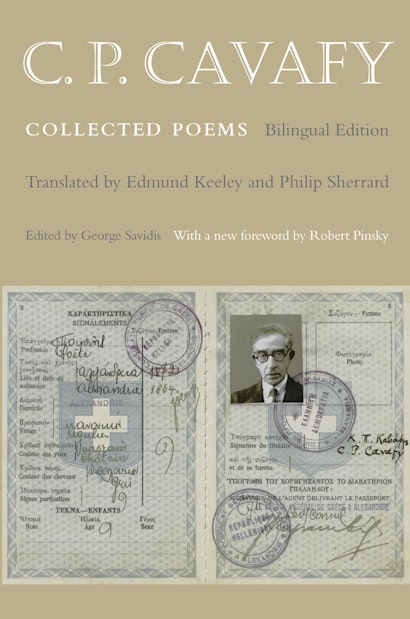C. P. Cavafy (1863-1933) lived in relative obscurity in Alexandria, and a collected edition of his poems was not published until after his death. Now, however, he is regarded as the most important figure in twentieth-century Greek poetry, and his poems are considered among the most powerful in modern European literature.
This revised bilingual edition of Collected Poems offers the reader the original Greek texts facing what are now recognized as the standard English translations of Cavafy’s poetry. It is this translation that best captures the poet’s mixture of formal and idiomatic language and that preserves the immediacy of his increasingly frank treatment of homosexual eroticism, his brilliant re-creation of history, and his astute political ironies. This new bilingual edition also features the notes of editor George Savidis and a new foreword by Robert Pinsky.
Edmund Keeley (1928–2022) was the Charles Barnwell Straut Class of 1923 Professor of English, emeritus, and professor emeritus of creative writing at Princeton University. Philip Sherrard (1922–1995) was research fellow at St. Antony’s College, Oxford, and lecturer in the history of the Orthodox Church at King’s College London. George Savidis (1929–1995) was professor of modern Greek at the University of Thessaloniki and George Seferis Visiting Professor at Harvard University.
"The best [English version] we are likely to see for some time."—James Merrill, New York Review of Books
"[This is] among the key books of our century and should be read by anyone who cares for poetry."—Washington Post
"[Keeley and Sherrard] have managed the miracle of capturing this elusive, inimitable, unforgettable voice. It is the most haunting voice I know in modern poetry."—Walter Kaiser, New Republic
"Auden ascribed Cavafy’s power to surmount translation to ‘a tone of voice,’ the revelation of ‘a person with a unique perspective on the world.’ That perspective is keenly evoked in a new translation by Edmund Keeley and Philip Sherrard."—T. E. Kalam, Time
"A splendid introduction. . . . [These] translations offer an immediate access to a world brilliantly peopled with Alexandrians and Greeks, a world where Anthony and Kaisarion come alive and speak."—Library Journal

